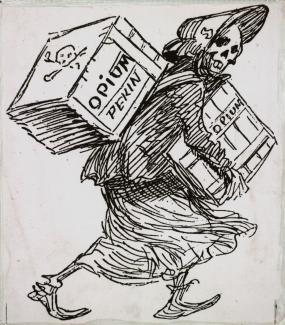Relevant reading
“Free trade” in the 19th century

Tom Wainwright is The Economist’s former Mexico correspondent. His book “Narconomics” compares drug cartels to multinational corporations. Both kinds of organisations are profit-driven. They must source commodities, process them and sell them to customers. The big difference is that drug cartels operate outside the law. They rely on violence to enforce contracts, dominate local markets and protect themselves. At the same time, they often form alliances with state agencies.
Wainwright shows convincingly that prohibition is not the solution. Indeed, the “war on drugs” that US President Richard Nixon launched in 1971 and that was adopted by policymakers around the world, only gave rise to a global black market. In the author’s eyes, one of four major mistakes that governments have been making is to mistake prohibition for control. In truth, he argues, the mafias are in control of the drug business. For business reasons, they focus especially on the most addictive and potent substances. To take control, governments should regulate the drugs market, Wainwright suggests. He appreciates that several US states have legalised marihuana.
According to Wainwright, the three other fundamental errors are:
- trying to block supply, even though the real issue is demand,
- spending heavily on law enforcement, but being scrimpy in terms of preventing addictions, and
- tackling problems at the nation-state level, even though the industry is global and supply routes are fast diverted through other countries.
Wainwright’s understanding of the market is profound. He interviewed top policymakers and police officers. He portrayed leading gangsters and coca farmers. He visited outlets for legalised marihuana in Colorado and prisons in Central America.
In his view, the demand for legalisation used to be raised by hippyish people who wanted to enjoy their intoxication. Today, however, it is raised by responsible people who want to prevent harm. His conclusion is: “Unless there is a real change in strategy, business conditions for the mafia will remain promising.”
Historical experiences
Drugs have always been commodities of great trade relevance, as Lucy Inglis shows in “Milk of paradise”. This history of opium starts with the first appearances of opium somewhere in the Mediterranean region more than 5,000 years ago. The final chapters deal with recent poppy cultivation in ISIS-held areas of Afghanistan and the impacts of opioids on modern western culture.
An overarching message of the book is that opium is at once a blessing and a curse. Opioids are indispensably effective painkillers. On the other hand, addiction destroys people, families and communities, while organised crime thrives on black markets.
Inglis elaborates convincingly why the term “free trade” does not inspire enthusiasm in China and India. In the 19th century, masses of Chinese were opium addicts. The drug was shipped in via the Port of Guangzhou, which Europeans called Canton, in the Pearl River Delta. This was where China did its foreign trade. Corruption was rife. In 1939, the Chinese emperor banned opium imports – and that ban triggered the first opium war. The war went on for three years, and the British Navy proved far superior. In the end, China was forced to open four more harbours to international trade, and Hong Kong became a permanent British outpost in the Pearl River Delta.
As Inglis elaborates, British merchants had developed a very profitable scheme. They imported tea from China to their home country. On the return trip, they first brought textiles from England to India, and then opium from India to China. This scheme was so lucrative that British companies made Indian farmers cultivate opium rather than cereals and lentils. When harvests were bad, this policy resulted in famine. The doctrine of “free trade” was that nothing could be opposed if it was good for merchants. By the way, Amitav Ghosh, the bestseller author from India, has published a fascinating trilogy of novels that is set in these historical circumstances.
Other imperialist powers became increasingly involved in the China trade too. The 2nd opium war from 1856 to 1860 reinforced their predominance. Inglis describes that China was brutally exploited, and masses of people found some comfort – though not sustenance – in opium consumption. According to estimates, up to a quarter of the people were addicted. As China increasingly lacked commodities to trade in, it began to export slave-like labourers. They brought along their opium habits to the countries they were shipped to. In the USA, opium was thus available along the railway lines that coolies built. Chinatowns – whether in San Francisco or in small settlements in the wild west – had opium dens.
What really made opiates widely used in North America was the Civil War, according to Inglis. Masses of soldiers were atrociously wounded in battle. Painkillers were needed. After the war, many veterans were traumatised – and addicted. Their demand proved to be lasting, and attempts to curb it failed.
When the USA later outlawed alcohol in the early 1920s, moreover, mafia organisations became involved in the trafficking of all kinds of other intoxicating substances, including opium and marihuana. Often, illegal goods were shipped in from Mexico. Ever since, organised crime has remained deeply entrenched.
References
Inglis, L., 2018: Milk of paradise – A history of opium. London: Macmillan.
Ghosh, A., 2008: Sea of poppies. London: John Murray (Ibis trilogy I).
Ghosh, A., 2011: River of smoke. London: John Murray (Ibis trilogy II).
Ghosh, A., 2015: Flood of fire. London: John Murray (Ibis trilogy III).
Wainwright, T., 2016: Narconomics – How to run a drugs cartel. London: Ebury Press/Penguin.







